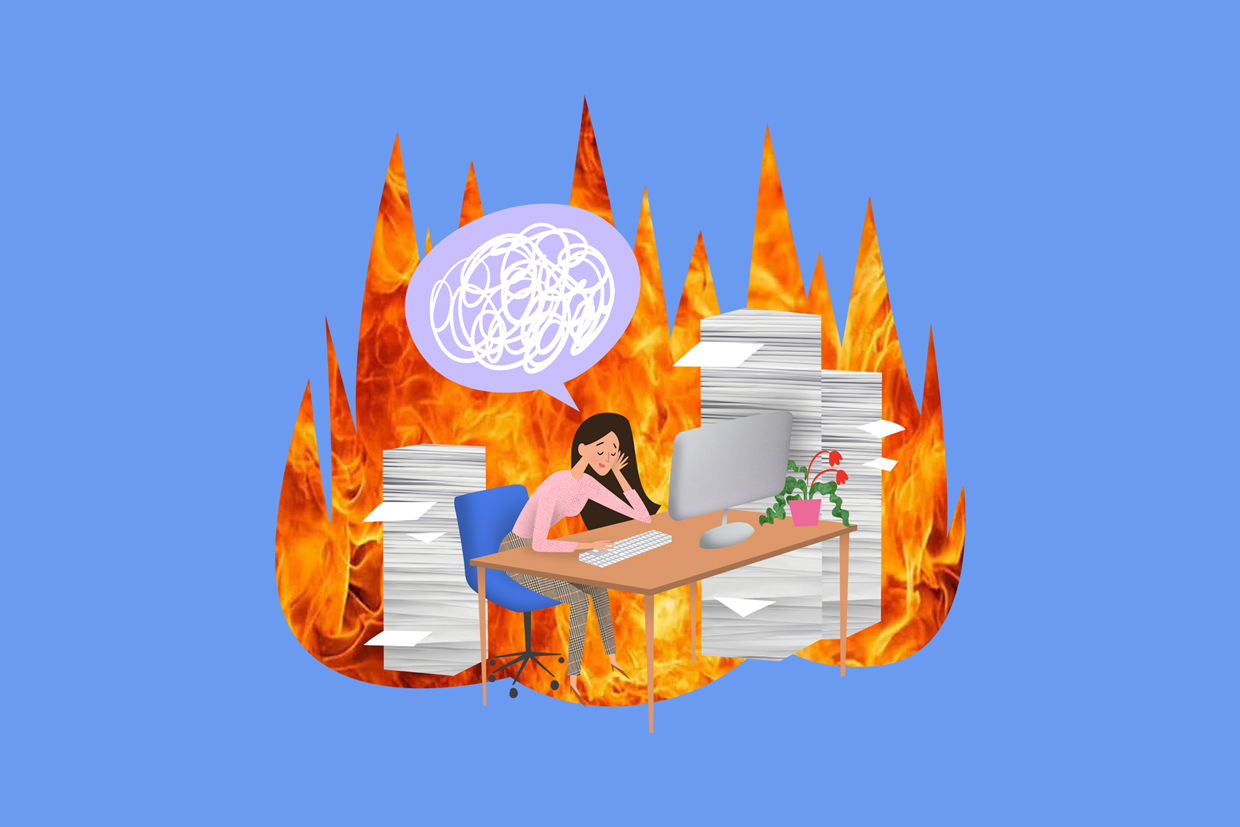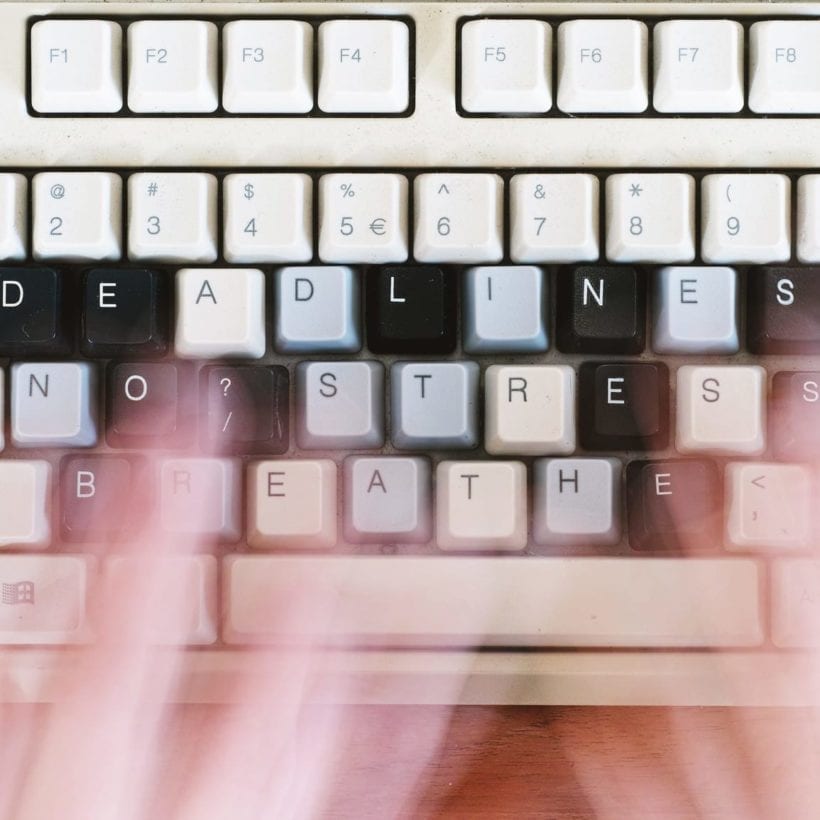If the last (almost) two years have felt like a hundred, you’re not alone. The pandemic has been an ongoing source of stress for everyone, depleting us of our energy, motivation and well, positivity. When we feel like we are going 100 miles per hour for an extended period of time, we’re bound to come to a stammering halt. This experience is called burnout, and it’s a genuine concern for our professional and personal lives. If you feel completely wiped out and drained, you could be heading toward a big ‘ole crash soon. Here, we spoke with career experts about the key signs of burnout, along with solutions on how to curve it.
What is burnout?
An easy way to visualize burnout is to think about lighting a match. When struck, there is a burst of flames. This is the start of your career, relationship, or friendship circle: flashy, exciting, fulfilling, and thrilling. As the fire burns, though, it slowly fades, eventually sizzling at the end with smoke. This is burnout, and it leaves you feeling exhausted and depleted both physically and emotionally, explains career expert Dr. Kerry Mitchell Brown. Usually, it’s caused by a continuous, prolonged period of high anxiety or stress. These cumulative experiences can lead to diminished physical health, mental distress, loss of interest in a job/life, and the associated confidence and confidence in one’s capabilities, Dr. Browns adds.

Signs you’re heading toward burnout — and what to do
Do you worry you are charging full-speed ahead toward burnout? Take a big breath. Let these signs and tips help you to slow down and regroup.
You dread going into work.
Forget the Sunday Scaries: you have the jitters every single evening when you know work is lingering in your near future. For those who are experiencing career burnout, the very thought of another Zoom meeting, a deadline, a Slack message or a chat with your manager can make your heart race. How do you know it’s true burnout — and not just a rough week? Dr. Brown says job dissatisfaction develops from extended feelings or reactions to career or work responsibilities.
Job dissatisfaction develops from extended feelings or reactions to career or work responsibilities
“These feelings and reactions go far beyond just a bad day in the office, a challenging assignment, or temporary work or life pressures,” she continues. “Symptoms of career and burnout can include extreme fatigue, disconnection from purpose/excitement about the role, and high levels of cynicism impacting your ability to assess situations effectively, solve problems, and make decisions.”
If this sounds like your experience, it’s time to reach out for support from a boss or human resources professional. “Job dissatisfaction can be diminished significantly by adequate support from your supervisor and your team,” Dr. Brown says. “Sabbaticals are also effective options to help individuals on the verge of burnout revitalize and renew by physically removing them from daily operations.”
You feel exhausted 24/7.
You had the recommended eight hours of sleep last night. You didn’t wake up once — and yet, you are so tired you can’t get out of bed in the morning. When you’re experiencing burnout, the very act of existing is tiring. “You feel tired all the time, have no energy, and it takes a lot of effort to do even the smallest of tasks,” explains Galit Ventura-Rozen, a business sales success expert and the co-founder of Everyday Woman.
To work through this and regain your motivation, the first step is to rule out any physical condition by getting blood work completed with your physician. “If it isn’t a physical or health issue, ask yourself if you are doing too much by analyzing your weekly schedule in great detail, then scheduling in self-care time and ‘me time,’” Ventura-Rozen suggests.

You keep getting sick.
No matter how healthy you eat, how often you exercise or how well you take care of yourself, do you feel like you always have the sniffles? Or a headache? Or some sort of illness? Increased physical diseases or mental health disorders can be telltale signs of burnout, warns Dr. Brown. To improve your overall wellbeing, look for areas where you can improve not only your physical health but your mental health, too.
“Therapy, private or offered through an employee assistance program, is an effective strategy to avoiding burnout,” Dr. Brown suggests. “External personal support networks can also be important tools that individuals can use to ease the stresses they are experiencing, often by focusing on the successes of those with whom they had close personal relationships.”
You have little motivation.
Before you started experiencing burnout, you could get through a 10-point to-do list in a day without breaking a sweat. But now that you’re feeling less like yourself, motivation is difficult (if not impossible) to come by. If you can’t work up the courage to do the things you once loved to do, Ventura-Rozen says the solution is to ask yourself these two questions:
- Do I still love what I do?
- Am I happy?
“If the answer is ‘no’ to either of these, it is time to find out why,” she continues. “It’s normal for the things that we love to do, and that make us happy to change as we grow. Take the time to explore the new things that you love and that make you happy and include them in your life and career.”
You’re constantly stressed out. 
You are preoccupied with work beyond work hours rather than disconnecting once you’re off the clock. You can’t stop worrying about every last detail and wondering if you’re living up to the expectation of your manager or company. James Bake, the chief operating officer at Best Self says this is one of the most significant signs of burnout.
The solution? Creating a ritual to ‘leave work at the door’ when it’s time to switch off is one way to create a boundary between work and personal time. “This could be going for a walk when the workday is done, or it could look like closing the door to your office or going to the gym. It could even be as simple as changing your clothes,” he continues. “The key is to do something that signifies the workday is done.”
You can’t stay in the moment.
We all have days when we feel zoned out or disconnect from our job or our relationships. But if you constantly feel like you’re somewhere else but in the moment, it could be a clear sign you’re overworking or have an issue that requires your personal attention.
The solution is to take some time alone and write down the thoughts that are crossing your mind when you are not present and not listening in these situations, Ventura-Rozen says. “Read those thoughts and deal with them. Sometimes they are worries, sometimes they are thoughts of a different life or career,” she continues. “Explore them and don’t ignore them. They are showing up for a reason and will not leave your mind. Missing out and not being present means you are missing out on moments you will not ever get back.”








